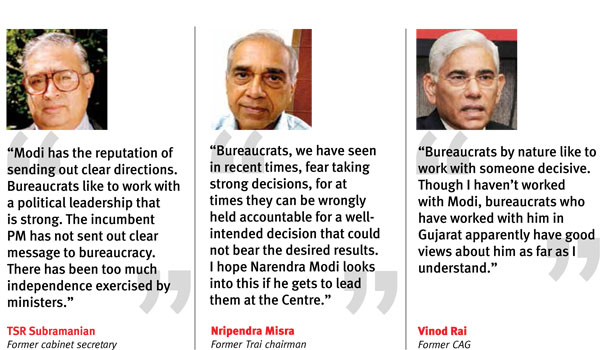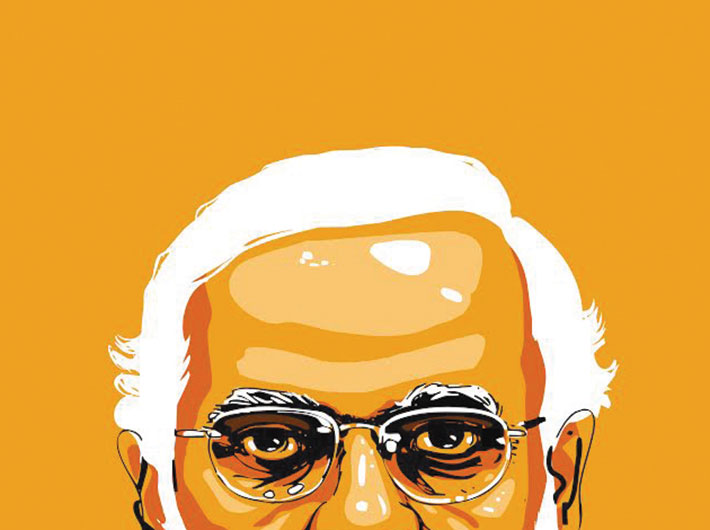Given the fact that there is little difference between the Gujarat model and the post-reform liberalised economic scenario across the country, achievement of Modi’s 11 years as chief minister can largely be credited to a less-talked about factor: a result-oriented bureaucracy. In this scheme of things, observers point out, Modi has set the political machinery – MLAs, party office-bearers – aside, and worked with handpicked officials to deliver whatever he has intended to deliver.
Also Read:
That would be the dream-come-true for dynamic and target-oriented bureaucrats, who have a free field to run the show with near-zero political interference. When we spoke to some of the secretary-level bureaucrats in Gandhinagar whose work won national awards, they were unanimous in pointing out the complete backing they have received from the political leadership. There are, on the other hand, several cases of bureaucrats who went against the political leadership and had to face serious music.
If Modi becomes the next PM, bureaucracy is in for interesting times.
Former cabinet secretary TSR Subramanian says, “Bureaucracy is sensitive and responds to commands which are clear. Modi has the reputation of sending out clear directions. Bureaucrats like to work with a political leadership that is strong. The incumbent PM has not sent out clear message to bureaucracy. There has been too much independence exercised by ministers.”
Former comptroller and auditor general (CAG) Vinod Rai echoes Subramanian’s views: “Bureaucracy by nature likes to work with someone decisive. Though I haven’t worked with Modi, bureaucrats who have worked with him in Gujarat apparently have good views about him as far as I understand.”
The Manmohan decade has been marred with allegations of policy paralysis and against that backdrop, Subramanian believes, Modi should give a better direction to bureaucracy.

Asked if he could draw a parallel between Modi’s perceived style of dealing with bureaucracy with any PM he worked with, Subramanian mentions the late PV Narasimha Rao. “Rao was as clear-headed as Modi seems to be. Though his style of conveying the message to the bureaucracy was delicate, he would spell out clear directions for us,” he says.
Former telecom regulatory authority of India (Trai) chairman and veteran administrator Nripendra Misra points out that while the bureaucracy draws its mandate from the constitutional parameters, it helps if bureaucrats know the mind of the political executive. “A good political executive defines clear-cut accountability for bureaucracy and that helps deliver in a given time,” says Misra. He also hopes that Modi will look into the problems of bureaucrats such as the challenges they face in implementing decisions.
“Bureaucrats, we have seen in recent times, fear taking strong decisions, for at times they can be wrongly held accountable for a well-intended decision that could not bear the desired results. They are sometimes even prosecuted for a decision they have taken in past. I hope Modi looks into this if he gets to lead them at the Centre,” Misra says.
Subramanian too believes that “bureaucracy is generally of high quality and is a very good horse. But in recent times, it has been left directionless.”
But given Modi’s autocratic image, is there much space for bureaucrats? A senior Gujarat cadre IAS officer who is chairman of a state-owned firm and has worked closely with Modi says on condition of anonymity: “He (Modi) is a very patient listener and open to new ideas. But I have to tell you that you cannot go to him with an idea or a suggestion without being well prepared. You cannot fool this man. He is very systematic. He gets to know if you have outsourced your presentation.
“But if you are thorough with your homework and convince him on your idea, he is more than happy to give his assent to it.”
He also points that Modi likes his bureaucrats to come up with out-of-the-box ideas. “Modi once visited an anganwadi centre and asked children what colour they wanted their school boundary to be painted in,” recalls the senior bureaucrat. “This, Modi suggested, would encourage children to come to school regularly.” The bureaucrat also believes that if Modi becomes PM, the cabinet secretariat’s working style will go for a major rejig.
(This story appeared in the April 16-30 print issue)

